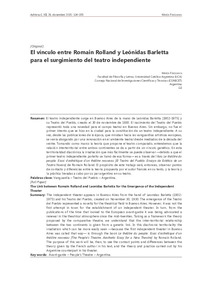Please use this identifier to cite or link to this item:
https://repositorio.uca.edu.ar/handle/123456789/5234| Título: | El vínculo entre Romain Rolland y Leónidas Barletta para el surgimiento del teatro independiente | Autor: | Fukelman, María | Otros colaboradores: | Universidad Católica Argentina (Buenos Aires). Facultad de Filosofía y Letras Consejo Nacional de Investigaciones Científicas y Técnicas (Argentina) |
Palabras clave: | TEATRO ARGENTINO; VANGUARDIA; Barletta, Leónidas, 1902-1975; Rolland, Romain, 1866-1944; LITERATURA ARGENTINA | Fecha de publicación: | 2015 | Editorial: | Centro di Ricerca Semiotica del Istituto Italo-argentino di Ricerca Sociale (Argentina) | Cita: | Fukelman, María. El vínculo entre Romain Rolland y Leónidas Barletta para el surgimiento del teatro independiente [en línea]. En AdVersus : revista de semiótica, 12(29), 2015 Disponible en: https://repositorio.uca.edu.ar/handle/123456789/5234 | Resumen: | Resumen: El teatro independiente surge en Buenos Aires de la mano de Leónidas Barletta [1902-1975] y su Teatro del Pueblo, creado el 30 de noviembre de 1930. El nacimiento del Teatro del Pueblo representó toda una novedad para el campo teatral en Buenos Aires. Sin embargo, no fue el primer intento que se hizo en la ciudad para la constitución de un teatro independiente. A su vez, desde las publicaciones de la época, que miraban hacia las vanguardias artísticas europeas, se venía abogando por una renovación en el ambiente teatral desde mediados de la década del veinte. Tomando como marco la teoría que propone el teatro comparado, entendemos que la relación interterritorial entre ambos continentes se da a partir de un vínculo genético. En esta territorialidad diacrónica la irradiación que más fácilmente se puede observar —debido a que el primer teatro independiente porteño se llamó de esa forma— es a través del libro Le théâtre du peuple. Essai d'esthétique d'un théâtre nouveau [El Teatro del Pueblo. Ensayo de Estética de un Teatro Nuevo] de Romain Rolland. El propósito de este trabajo será, entonces, observar puntos de contacto y diferencias entre la teoría propuesta por el autor francés en su texto, y la teoría y la práctica llevadas a cabo por su par argentino en su teatro Summary: The independent theater appears in Buenos Aires from the hand of Leonidas Barletta (1902-1975) and his Teatro del Pueblo, created on November 30, 1930. The emergence of the Teatro del Pueblo represented a novelty for the theatrical field in Buenos Aires. However, it was not the first attempt in town for the establishment of an independent theater. In turn, from the publications of the time that looked to the European avant-garde it was being advocated a renewal in the theatrical atmosphere since the mid-twenties. Taking as a framework the theory proposed by the comparative theatre, we understand that the inter-territorial relationship between the two continents is given from a genetic link. In this diachronic territoriality the irradiation which can be more easily seen ―because the first independent theater in Buenos Aires was called that way― is through the book Le théâtre du people. Essai d'esthétique d'un théâtre nouveau [The People's Theatre. Aesthetic Essay for a New Theatre] by Romain Rolland. The purpose of this work will be, then, to see the contact points and differences between the theory given by the French author in his text, and the theory and practice carried out by his Argentine counterpart in his theater |
URI: | https://repositorio.uca.edu.ar/handle/123456789/5234 | Disciplina: | LITERATURA | Derechos: | Acceso Abierto | Fuente: | AdVersus : revista de semiótica 12(29), 2015 |
| Appears in Collections: | Artículos |
Files in This Item:
| File | Description | Size | Format | |
|---|---|---|---|---|
| XII2907.pdf | 260,03 kB | Adobe PDF |  View/Open |
Page view(s)
120
checked on Apr 30, 2024
Download(s)
209
checked on Apr 30, 2024
Google ScholarTM
Check
This item is licensed under a Creative Commons License

